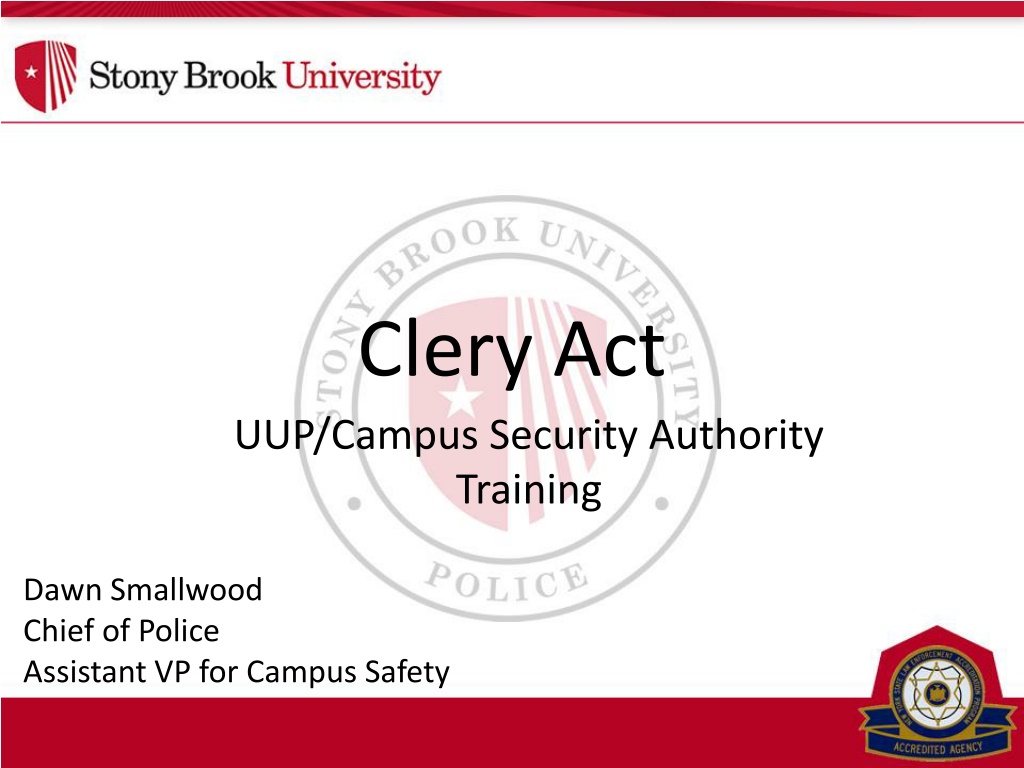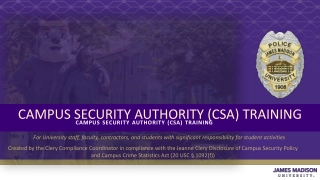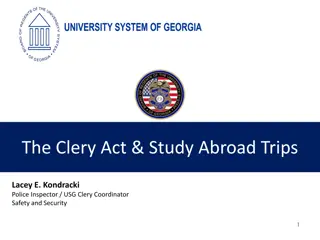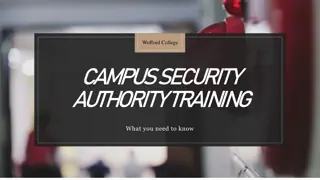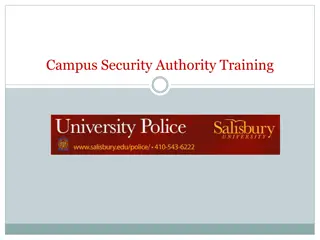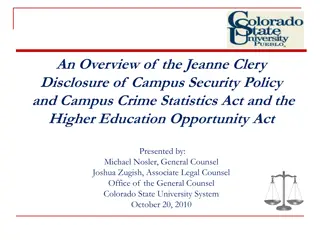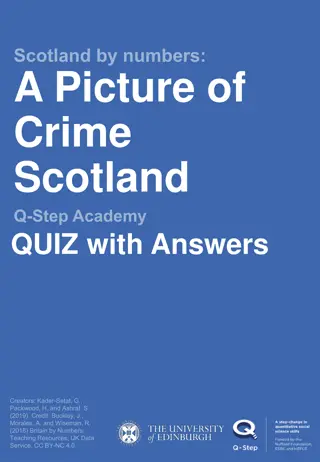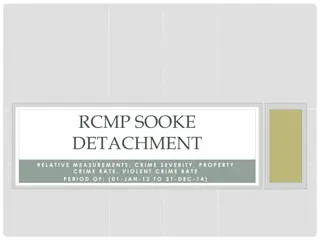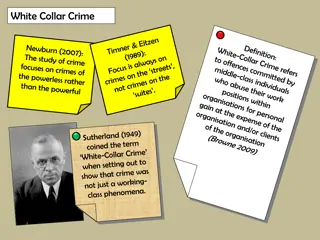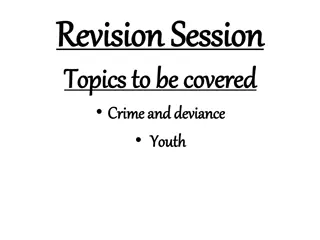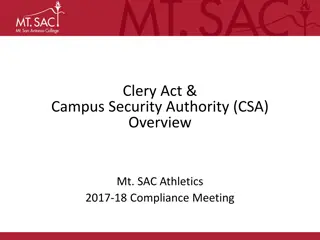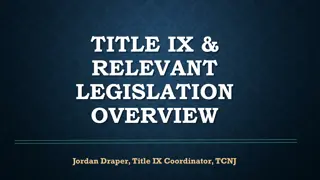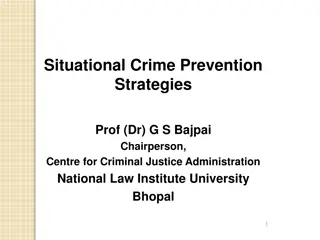Understanding the Clery Act: Campus Security & Crime Reporting Requirements
The Clery Act, named after Jeanne Clery who was a victim of campus crime, mandates colleges and universities to disclose campus crime statistics and security information. Institutions must collect, classify, and report crime data, issue emergency notifications, and publish annual security reports. Compliance with the Clery Act is overseen by the US Department of Education to ensure campus community safety and awareness.
Download Presentation

Please find below an Image/Link to download the presentation.
The content on the website is provided AS IS for your information and personal use only. It may not be sold, licensed, or shared on other websites without obtaining consent from the author. Download presentation by click this link. If you encounter any issues during the download, it is possible that the publisher has removed the file from their server.
E N D
Presentation Transcript
Clery Act UUP/Campus Security Authority Training Dawn Smallwood Chief of Police Assistant VP for Campus Safety
The Jeanne Clery Campus Security Policy and Crime Statistics Disclosure Act Federal statue (20 USC 1092(f)) requires all colleges and universities that participate in Federal Title IV student financial aid programs to disclose campus crime statistics and security information. Compliance with the Clery Act falls under the mandate of the US Department of Education.
What is the Clery Act? Jeanne Clery was raped and murdered while asleep in her dorm room at Lehigh University in 1986. She was murdered by another student who had entered her dorm through three propped doors. Her parents discovered that there had been numerous reports of propped doors and there had been 38 violent crimes in the three years prior to her murder at Lehigh. Her parents believed Jeanne would have been more cautious if she had known about the other violent crimes at Lehigh. The law enacted in her memory is intended to ensure that students and other campus community members are informed about campus crime so they can make informed decisions.
What Does Clery Require? Institutions must: Collect, classify and count crime reports and submit statistics to the US Department of Education. Provide emergency notification and evacuation procedures. Issue a timely warning for any Clery Act crime that represents an ongoing threat to the safety of students or employees. (May issue a timely warning to non-Clery crimes) Issue an emergency notification upon the confirmation of a significant emergency or dangerous situation involving an immediate threat to the health or safety of students or employees occurring on the campus.
What Does Clery Require? Publish an annual security report and fire safety report (by Oct 1 of each year) containing required safety and security- related policy statements and crime statistics for the previous three calendar years and distribute it or advise where to locate it electronically to all current students and employees. Schools also must inform prospective students and employees about the availability of the report. Inform the campus community where to obtain information about registered sex offenders Create, maintain and make available a crime log and fire log.
The Department of Education recognizes students may be more inclined to report crimes to someone other than the campus police. For this reason, the Clery Act requires all institutions to collect crime reports from a variety of individuals and organizations that Clery considers to be "campus security authorities. Data is collected from a wide variety of campus security authorities to provide the most accurate crime statistics possible.
Records Collection and Retention University Police must: -Keep records of crimes reported to campus security authorities -Make efforts to obtain certain crime statistics from other law enforcement agencies -Keep a daily crime log open for public inspection -Keep campus records & request records from other law enforcement agencies
Campus Security Authorities Officials of the institution with significant responsibility for student and campus activities (Vice Presidents, Deans, Directors, etc.), including but not limited to the areas of: Student Affairs Dean of Students Ombudsperson Multicultural Student Services University Life Residence Life (to include RA s/RHD s/QD s) Community Standards Title IX Coordinator Police/Security Academic Advisement Career Services Continuing Education Financial Aid Instructional Support Disability Services Orientation Administrators who oversee branch campuses Athletic directors, coaches and assistant coaches Human Resources/Labor Relations Faculty or staff advisors to student organizations or those that serve as formal or unofficial mentors to students Office of Equity and Access
Who is NOT a Campus Security Authority? You may have significant responsibility for Student and Campus Activities but YOU DO NOT HAVE TO REPORT IF: You are a licensed mental health counselor or a pastoral counselor (employed by a religious organization to provide confidential counseling) AND You are working within the scope of your license or religious assignment Student Health Center Clinicians who only provide care to individual students Counselors in the Counseling Center who only provide care to individual students
Campus Security Authoritys Primary Responsibility is To report allegations made in good faith to the reporting structure established by the institution. In good faith means there is a reasonable basis for believing that the information is not simply rumor or hearsay. That is, there is little or no reason to doubt the validity of the information. If a campus security authority observes a crime/violation or receives the crime information and believes it was provided in good faith, he or she should document it by reporting to the University Police (2-3333), Student Conduct and Community Standards (2-6705), or Title lX (2-6280) as soon a practicable. What you must disclose, therefore, are statistics from reports of alleged criminal incidents. It is not necessary for the crime to have been investigated by the police or campus security authority, nor must a finding of guilt or responsibility be made to disclose the statistic.
In Your Role as a CSA, Please Remember To inform the University Police Department, Student Conduct and Community Standards or the Title lX office as soon as practicable about Clery reportable crimes or violations. University Police will make the final crime classification determination If in doubt or unsure, report it to the police 631-632-3333 or 2-3333 from any campus phone
What Crimes Must I Report? Manslaughter Sex Offenses Rape, Fondling, Statutory Rape, and Incest Robbery Aggravated assault Burglary Motor vehicle theft Arson Hate crimes- Any Clery reportable offenses and any incidents of Larceny-Theft, Simple Assault, Intimidation, or Destruction, Damage, or Vandalism of Property that were motivated by bias based on race, religion, sexual orientation, gender, gender identity, ethnicity, nation origin or disability. Arrests & disciplinary referrals for violations of liquor, drug, & weapons laws Dating Violence, Domestic Violence, Stalking (New Additions) Criminal homicide Murder/Non-negligent Manslaughter, Negligent
Dating Violence Dating Violence The term dating violence means violence committed by a person who is or has been in a social relationship of a romantic or intimate nature with the victim; where the existence of such a relationship shall be determined based on a consideration of the following factors: The length of the relationship The type of relationship The frequency of interaction between the persons involved in the relationship
Domestic Violence Domestic Violence -The term domestic violence includes crimes of violence committed by a current or former spouse of the victim, by a person with whom the victim shares a child in common, by a person who is cohabitating with or has cohabitated with the victim as a spouse, by a person similarly situated to a spouse of the victim under the domestic or family violence laws of the jurisdiction, or by any other person against an adult or youth victim who is protected from that person s acts under the domestic or family violence laws of the jurisdiction.
Stalking Stalking The term stalking means engaging in a course of conduct directed at a specific person that would cause a reasonable person to fear for his or her safety or the safety of others; or suffer substantial emotional distress.
Liquor, Drug, Weapon Law Violations Police must keep statistics on the number of people arrested for liquor, drug and weapon law violations. Residence Life and University Community Standards keep statistics on the number of people referred for disciplinary action for liquor, drug and weapon law violations. Statistics must reflect the total number of persons involved, not incidents.
Where Did it Happen? A crime must be reported if it occurred: On campus main and satellite (i.e. Southampton, Manhattan, SUNY Korea) Non-campus building or property (i.e. Tech Park, Calverton) Public property on/or immediately adjacent to campus and easily accessible from campus (i.e. 25A, Nicholls Road)
What is On Campus? Owned or controlled by the institution within the same reasonably contiguous geographic area and used to meet or support the institutions educational purposes Residence Halls (also a subset category) Administrative Buildings Academic Buildings Food and Retail Vendors
What is Non-campus? Any building or property not part of the main campus nor a satellite campus and is: Owned or controlled by the institution Used in support or in relation to the institution s educational purposes Frequently used by students Not within the same reasonably contiguous geographic area of the institution Owned or controlled by a student organization that is officially recognized by the institution Non-Campus includes: Study Abroad Programs, Extended Educational Programs where travel is required and extended Athletic Events where housing is not provided by the hosting school
What is Public Property? All public property that is within the campus, or immediately adjacent to and accessible from the campus Thoroughfares Streets Sidewalks Public parking facilities Private homes and businesses are not included
Three Part Test 1. Is the crime a Clery reportable crime? 2. Did the crime occur in a Clery reportable geographic area? 3. Was the crime previously reported to University Police? If you answered YES to Question #1 and #2 and NO to Question #3, then you must notify University Police about the incident.
Examples of Reportable Crimes A coach is required to report a sexual assault that is reported to them A person working as an access monitor is required to report a burglary that is reported to them while working the desk An RA is told by a student that she was forcibly raped by an unidentified person while jogging along a campus trail The Director of Athletics is required to report a rape that was reported to them by the parent of a victim involving one of their athletes who may be the perpetrator A professor is required to report that a student reported to them that they were being physically abused by their intimate dating partner
Rights of Reporting Individual You have the right to make a report to university police or campus security, local law enforcement, and/or state police or choose not to report; To report the incident to you institution; To be protected by the institution from retaliation for reporting an incident; and, To receive assistance and resources from your institution. NY Education Law, Section 6444(2)
Confidentiality vs. Privacy Confidentiality may be offered by an individual who is not required by law to report known incidents of sexual assault or other crimes to institution officials, in a manner consistent with state and federal law, including but not limited to 20 U.S.C. 1092(f) and 20 U.S.C. 1681(a). Licensed mental health counselors, medical providers and pastoral counselors are examples of institution employees who may offer confidentiality. Privacy may be offered by an individual when such individual is unable to offer confidentiality under the law but shall still not disclose information learned from a reporting individual or bystander to a crime or incident more than necessary to comply with this and other applicable laws, including informing appropriate institution officials. N.Y. Educ. Law 6439
Confidentiality vs. Privacy Only UUP Members with a legal privilege and who maintain that privilege in their specific role can maintain true confidentiality All other Members may offer privacy, but may not promise confidentiality to reporting individuals When communicating with a reporting individual, UUP Members who ordinarily have a legal privilege (e.g., attorney-client) may be unable to maintain the privilege when acting in their official university role
Retaliation Retaliation is prohibited against any participant in the reporting process Retaliation is prohibited against a UUP Member for reporting a crime or violation Failure to properly report a covered incident may result in discipline
Reporting Resources Survivor Advocate ..631-647-9981 Center for Prevention and Outreach (CPO) 631-632-2748 Counseling and Psychological Services (CAPS) ..631-632-6720 Interfaith Center: http://www.sbinterfaith.org/ SAFE Center (Sexual Assault Forensic Examination 631-444-2465 Student Health Services 631-632-6710 NYS Office of Victims Services (OVS) ....................1-800-247-6035 VIBS (Victim Information Bureau of Suffolk .631-360-3606 SUNY Sexual Assault and Violence Response (SAVR): https://www.suny.edu/violence-response/ Additional Community Based Resources: https://www.stonybrook.edu/commcms/oea- titleix/resources/ In an emergency dial 911. This will reach University Police from any campus phone and local police from any non-campus phone. University Police .. ..631-632-3333 Title IX Coordinator ...................631-632-6280 Office of Student Conduct and Community Standards .631-632-6705 Employee and Labor Relations East Campus .631-632-6140 Employee and Labor Relations Stony Brook Hospital ...............................631-444-3780 Employee and Labor Relations L.I. State Veterans Home 631-444-8617 NYS Police 24-Hour Campus Sexual Assault Hotline ... ...........................1-844-845-7269
Possible University Sanctions for Noncompliance A suspension or limiting of the institution s Title IV funding. The Department of Education can issue civil fines up to $59,017 per violation. Final Review Determination Reports are public record. Failure to comply with the Clery Act can be used in court to demonstrate an indifference to security issues during a premises security liability litigation.
Questions Any questions regarding the content of this power point presentation can be directed to: campus_csa@stonybrook.edu All other inquiries can be directed to: Hrs_info@stonybrook.edu
